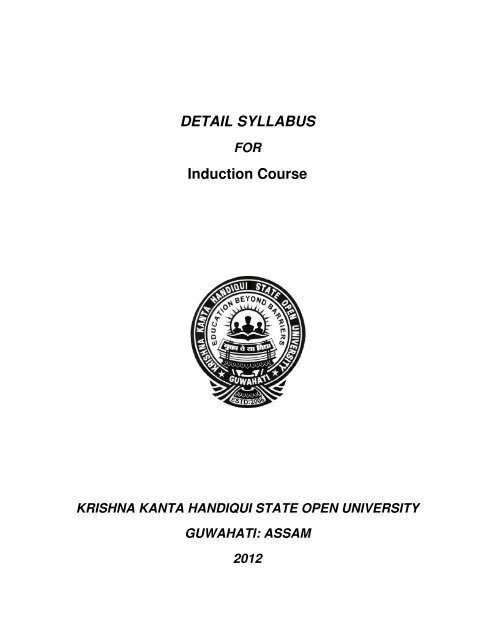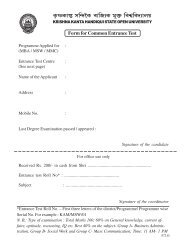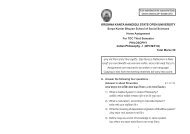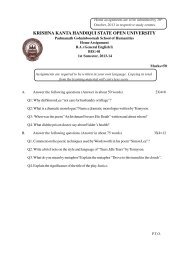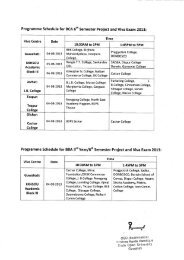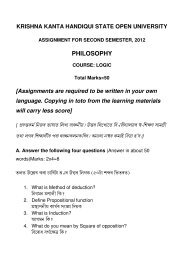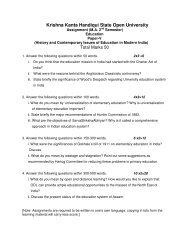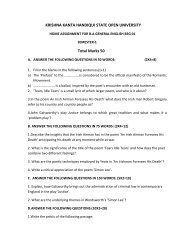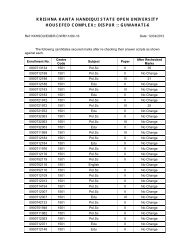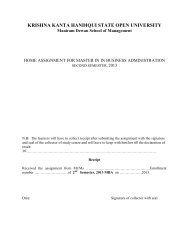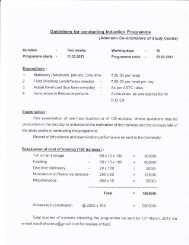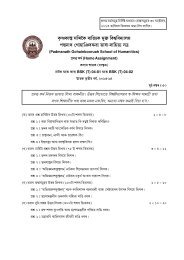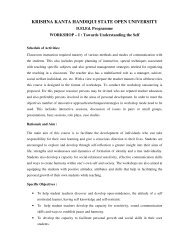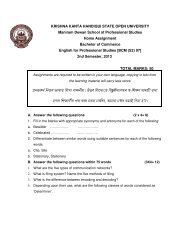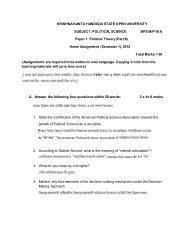DETAIL SYLLABUS Induction Course - krishna kanta handiqui state ...
DETAIL SYLLABUS Induction Course - krishna kanta handiqui state ...
DETAIL SYLLABUS Induction Course - krishna kanta handiqui state ...
You also want an ePaper? Increase the reach of your titles
YUMPU automatically turns print PDFs into web optimized ePapers that Google loves.
<strong>DETAIL</strong> <strong>SYLLABUS</strong>FOR<strong>Induction</strong> <strong>Course</strong>KRISHNA KANTA HANDIQUI STATE OPEN UNIVERSITYGUWAHATI: ASSAM2012
A. Philosophical and PsychologicalUnderstanding ofEducationUnit 1: Philosophical Understanding of Education• Concept of education• Education and Schooling• Education and Schooling as visualized by some eminent Indian thinkers -Gandhi,Tagore, SwamiVivekananda, Radha<strong>krishna</strong>nUnit 2: Aims of Education• Meaning, types and determinants of aims of education• Aims of education with respect to major schools of philosophyUnit 3: Understanding the Child• Meaning of Growth and Development• Relationship of Growth and Development• Principles of Development• Educational importance of early childhood and later childhood years• Educational importance of Drive, Motivation, Instinct and EmotionUnit 4: Children as Diverse Learners• Concept of Individual Difference• Areas of Individual Difference• Nature Vs. Nurture Controversy• Childhood in a Modern State
B. Teacher as a FacilitatorUnit 1: Teacher and Society• Concept of Teaching and its relationship with learning• Role of teachers in society• Need for professional development of teachers,RTE 2009• Teaching as a profession, its autonomy and accountabilityUNIT 2: Designing Learning Experiences• Planning a unit and a lesson• Individualized attention• Altering activities to meet different needs of childrenUNIT 3: Reflection on role of teachers• Teacher as a Manager, Communicator and Problem Solver• Classroom managementand Time planning• Criteria for choosing technology for teaching-learning• Necessity of effective communication between parents and teachersUnit 4: Teaching Skills• Teaching and Learning• Teachers and Teaching Skills• Types of teaching skillsUNIT 5: Assessment and Evaluation• Meaning and Concept of Evaluation• Tools for Evaluation• Evaluation of Scholastic and Non-Scholastic Aspects• Reforms in Evaluation
C. Basics of Mathematics and EnglishUnit 1: Issues of teaching Mathematics at Elementary Stage• Importance of mathematics in day to day lives• Aims, objectives and educational values of teaching mathematics• How to make mathematics learning joyful• Effect of socio-cultural background of children on mathematical knowledge• Role of language of communication in a mathematical classroomUnit 2: Evaluation in mathematics• Meaning, purpose and process of evaluation• Continuous and comprehensive evaluation in mathematics• Learner’s achievement test• Test Items• Reliability, validity and objectivity of a test• Oral test• Home assignmentUnit 3: Issues of teaching English at the Elementary Stage• Issues of learning English in a multi-lingual, multi-cultural society• Teaching English as a second languageUnit 4: Skills of English Teaching• Listening and Speaking• Reading• WritingUnit 5- Assessment and Evaluation in English• Ways of carrying out Continuous and comprehensive evaluation in English


